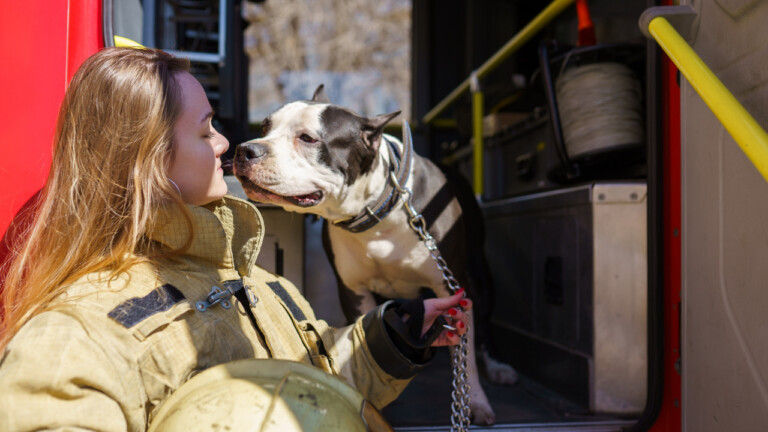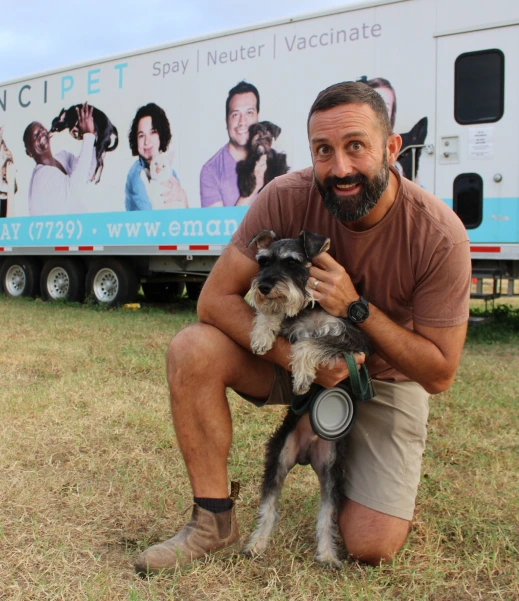In 2015, Toronto-based photographer Pete Thorne, created “Old Faithful,” a collection of intimate portraits of elderly dogs. His subjects, many who were deaf, blind, or both, all had one thing in common- their faces showed their age. And what a beautiful thing.
All the character, the history, and the strength- anyone could see what made these dogs so special to their owners- not what they used to be, but simply who they were now.
There are all kinds of changes the body- any body goes through as it ages. Most are normal, but some can indicate trouble. So, what should you expect as your dog ages?
The Same, but Different
Giant breeds have a shorter life expectancy, around 7-8 years, while some dogs don’t really even reach geriatric status until about 11 years of age. Some dogs will show signs of aging sooner than others. Some will slow down, some will seem like a puppy until the end.
Salt & Pepper
The first thing you’ll probably notice as your dog matures is graying around the face and muzzle. This usually begins during the middle age years, but like people, dogs can gray prematurely too- even as early as 2 or 3 years.
Take it Down
Most dogs will slow down as they age. Notice how she gets up, manages stairs, and lays down. Arthritis is fairly common in dogs, just pay attention to her stiffness, and also notice if it seems to be worse in rainy or chilly weather.
There are all kinds of therapies to help a dog suffering from arthritis. Use herbs and vitamins for joint support and pain relief, try acupuncture, massage, gentle exercise, laser therapy, and medications to ease your dog’s discomfort.
Say What?
Hearing loss is expected. While it’s not preventable, there are things you can do to make a deaf or partially deaf dog more at ease. Train with both hand signals and verbal cues when your pet is young, it will make it much easier to communicate as your dog ages. Try not to startle your pet, and protect them from cars, children, and other animals they can’t see or hear coming. Don’t forget that hearing loss has its advantages…Fireworks? What fireworks, I didn’t hear anything. Thundershirt? No thanks, I don’t believe it’s even raining.
It’s Getting Cloudy
You might notice changes in your dog’s eyes. A bluish, cloudy transparent haze in the pupil section is something called nuclear sclerosis. It’s a normal sign of aging, and doesn’t seem to affect vision. Cataracts are white, and opaque and do affect vision. See a veterinary ophthalmologist if you see any changes in your pet’s eyes, if not sooner.
As your dog’s vision changes, make sure that he is protected from falls and other pets, as well as kids and cars. Make sure your dog is comfortable with the layout of your home- now is not the time to redecorate. Use markers to help him find his way around. Use textures by important spots, like a rubber mat under his food bowl, and drops of different essential oils- like peppermint and lavender to mark doors and separate rooms.
Up All Night
Physical challenges, like pain & having to urinate more frequently can lead to changes in sleeping patterns. Cognitive changes can also contribute to sleepless, restless nights for your dog (and probably for you, too), but there are medications and supplements that can help. Talk to your veterinarian to understand your options, and try to maintain a routine in your home.
So Lonely
Older dogs frequently experience separation anxiety like they never have before. Your dog may become very anxious when she realizes you are about to leave. And after your gone, your dog may howl, bark, and salivate excessively. Neurological changes, deafness and blindness may contribute to your dog having a more difficult time when she is left alone.
You can help your pet by sneaking out of the house when you must leave, and don’t make a big deal out of returning. Change your dog’s departure clues. For instance, if you always pour a to-go cup of coffee when you’re headed to work, pour one and sit on the couch. If your dog knows that when the keys jingle, you’re out of there, grab your keys and just relax with your pet on the floor for a while.
Try leaving for short periods, gradually increasing the time you’re away. You can also make your departure pleasant for your pet. Many people use relaxing music, lavender oil sprayed on a pet’s bed, and even supplements or medications formulated to help keep Fido calm.
No Filter
You may have noticed that elderly humans will say just about anything that’s on their mind. The older we get, the less we seem to care about being appropriate- we sort of lose our filters. The same seems to be kind of true for dogs. Again, physical discomfort could be the cause, it could neurological, or a combination of both, but senior dogs can sometimes be grumpy and even aggressive. Keep your dog’s life as consistent as possible. New people, places, and puppies can make an older dog irritable. Watch for cues, and protect your dog and look out of the safety of other pets and people, too. Keep in mind that an alpha dog, as he ages, will often see his role challenged by other dogs in the household.
Those of us lucky enough to share our homes and hearts with an older dog know that seniors are special. We all face certain challenges as we grow old, and the same is true for our furry best friends. We may learn the importance of inner beauty, or maybe we develop more patience than we ever thought we could have. One thing we know for sure, love is ageless.




